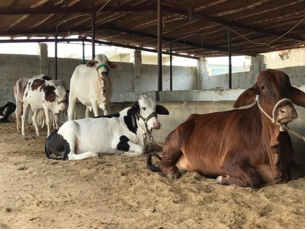INP-WealthPk
Muhammad Luqman
The provincial livestock department has launched large-scale relief operations to protect cattle and other livestock from waterborne and infectious diseases in flood-affected districts of Punjab. These include establishing veterinary relief camps and rolling out an extensive vaccination campaign.

Floods in Punjab have so far ravaged 4,100 villages across 25 districts situated along rivers, hill torrents, and nullahs. These districts also house a significant portion of the province’s livestock population, estimated at around 104 million. “We have set up 482 flood relief camps across Punjab. More than 3,373 veterinary officers and support staff are working round-the-clock at these camps,” said Dr Haider Ali Khan, Director of Punjab Livestock Extension, while talking to Wealth Pakistan.
In addition, he noted that 175 branded mobile veterinary dispensaries and 33 mobile labs had been deployed to deliver treatment and vaccination services in remote and inundated areas. According to Dr Ali Khan, floods have heightened the risk of diseases like haemorrhagic septicemia (HS or Gal Ghotu) and foot and mouth disease (FMD-Moon Khur) among cattle and small ruminants, while poultry remain vulnerable to Newcastle disease (ND or Rani Khet).
He added that stagnant water and stress were also contributing to tick infestations, fever, diarrhoea, bloat, and parasitic infections. Through proactive measures, the department has so far vaccinated 939,305 animals against HS, FMD, ND, and other infections, while 233,539 animals have been treated for common illnesses.
“Only one outbreak of lumpy skin disease was reported in district Lodhran in South Punjab, which was immediately controlled through treatment and ring vaccination,” Dr Khan said. Dr Khan urged the farming community to take precautionary measures to safeguard their animals in flood conditions.
“They should move livestock to dry, elevated areas away from floodwaters. For this purpose, the government is also providing all possible assistance, including transportation,” he explained. He also emphasised the importance of providing clean drinking water and balanced feed such as silage, wheat straw, green fodder, and wandda (a concentrated feed) to maintain animal health.
On the extent of livestock losses, Dr Muhammad Usman Tahir, Additional Secretary of Livestock Punjab, told Wealth Pakistan that a damage assessment was currently underway. “It will be shared publicly after reconciliation with all relevant departments and district administrations,” he said.
Livestock experts have welcomed the government’s relief measures but stressed the urgent need to ensure feed availability in flood-hit areas. “The government should ensure the provision of balanced feed to animals rescued from floodwaters at every cost to strengthen their immunity against diseases,” said Dr Hafiz Wasi Ahmad Khan, a member of the Punjab Agriculture Research Board.
Talking to Wealth Pakistan, he suggested that feed supplies be airdropped to marooned animals, just as food aid is provided to stranded people. Ahmad Khan also warned that vaccinating hungry and undernourished animals could prove counterproductive. “Silage and hay can be the best form of feed for flood-affected animals as these are available throughout the year,” he said.
Credit: INP-WealthPk









